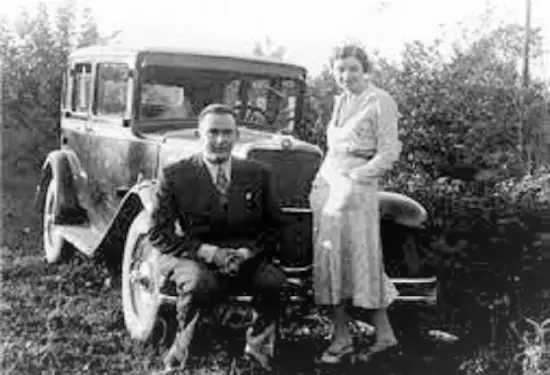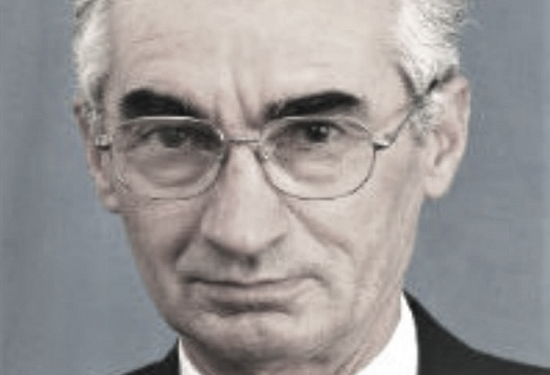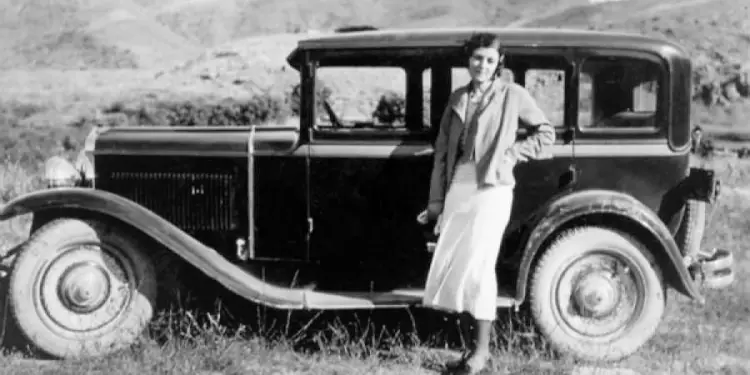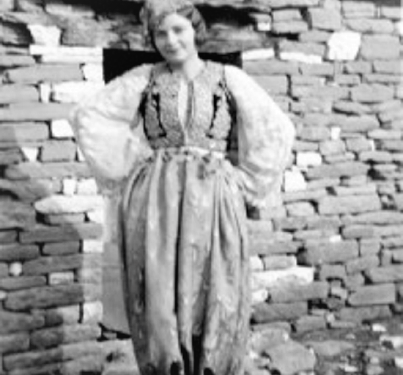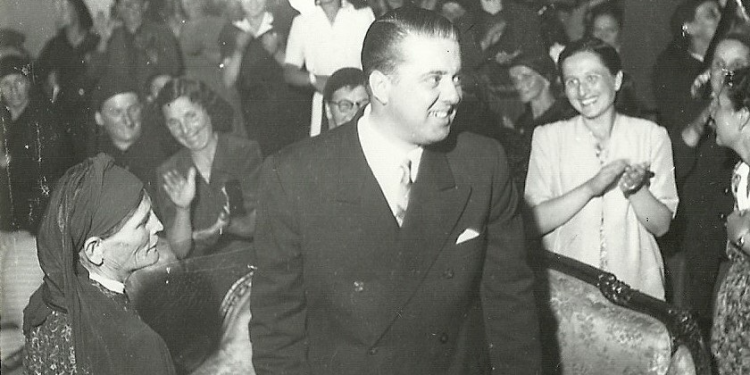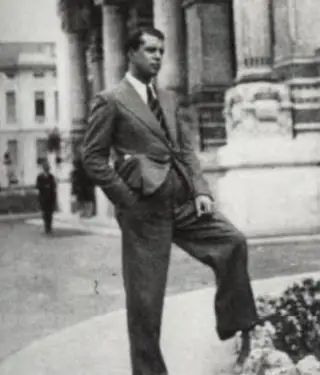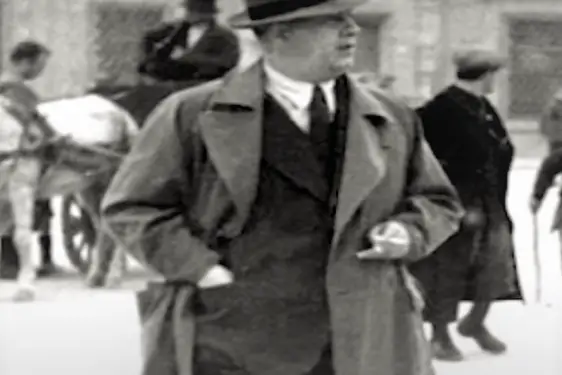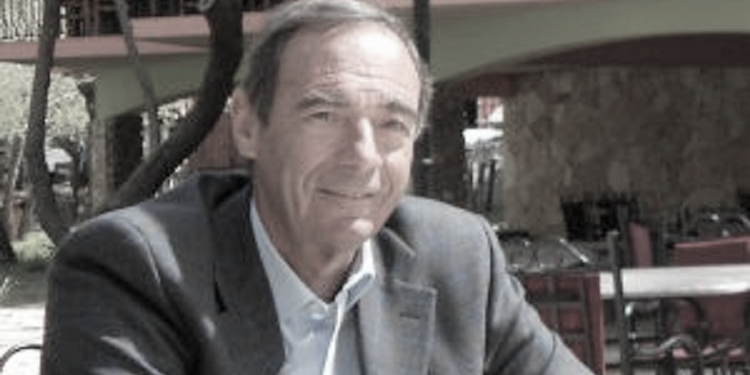By Eugene Merlika
Reflections on the novel, “ My concern albanian”, by the Italian author, Aldo Renato Terrusi
Memorie.al / There are periods in the history of humanity, in which the fate of individuals is inextricably intertwined with that of communities, peoples, and nations. They are periods in which events go out of the ordinary, overturning individuals, who turn into mere numbers, and who, more and more, resemble yellow leaves fallen from trees, blown hither and thither by the wind. One of these periods can be found in the novel of the writer Aldo Renato Terrusi. “My Albanian concern” is not enough to tell the story of a man’s journey in search of paternal love, lost almost half a century ago. Through this narration, the author finds the opportunity to tell the story of a family that, in a certain way, becomes the emblem of a society and, more broadly, of a nation in a certain period of its history.
The examined period is that of the twentieth century, focusing mainly on its first half. It is perhaps the most confused of all European history, with two world wars and tens of millions of dead, with images of disintegrated and re-created states, dictatorial systems that reach the peak of violence and criminality, through mass massacres, extermination camps and eternal gulags, freedom personals forbidden, human lives washed away without mercy. The scene of events is the Balkan Peninsula, the “powder keg of Europe” and especially Albania.
In this context, the story of the Poselli family is elaborated, which is similar to that of many Italian families who, in Italy in the late 800s and early 900s, emigrated in search of fortune abroad, in developed countries or not, but everywhere rewarded with enviable systems, understanding and respect, thanks to ingenuity, will and seriousness at work. After some experiences in Egypt, Turkey and Greece, the Posells settle in Albania and this country, which will be the birthplace of the author, for better or for worse, will become the bearer of their destinies.
This is where the love between Aurelia Poselli and Giuseppe Terrusi is born; this is where the family’s dream is embodied. In this country, uncle Giaccomo will become known, thanks to his participation in the national football team, as a goalkeeper. The author, in his narration, describes three Albanias, which are the same country, but in three different phases of its history. The first is that of King Zog and the Second World War, the second is that of the communist regime and the third is today’s, post-communist.
The first is normal Albania, a backward country that, for a few decades, for the first time in its history, has been able to create a united states, even if it is crippled and halved in its territories, due to unjust decisions of the Great Powers. This Albania, with all its thousand problems, is a normal country, where everyone, as far as possible, can build a life, can make projects, can realize dreams, can seek fortune abroad, can hope for a better future.
In this Albania, the life of Italians flows normally, even among the difficulties, understandable for a backward country. In this framework, the author elaborates the history of human relations, a little confused, between Aurelia Poselli and Enver Hoxha. The latter fell in love with the beautiful 16-year-old Italian girl, persistently sought to win her heart, and even gave her a book with a dedication, which fully proves his fraudulent character.
He signs as “medical student”. It is a lie, just as the data on Enver Hoxha’s studies are false. The future dictator was not able to take the exams at the University of Montpellier, where the Albanian state, thanks to the recommendations of people in high positions, had given him a scholarship, which Minister Ivanaj suspended for that reason.
Aurelia rejected this boy’s love proposal, along with his theories of communist revolution. This is where her misfortune begins, which is embodied in the second Albania, in the one that was born on November 29, 1944. That day, called the day of liberation, was none other than the day of the occupation of the country by a system that was with death, misery, backwardness, lack of freedom, terror for almost half a century, complete isolation from the Western world.
This system and its architect, Enver Hoxha, were responsible for endless human tragedies. The figures of communist oppression in Albania are terrifying: executions of 5,577 men and 450 women, sentences of forced labor for 26,768 men and 7,367 women, 1,065 deaths in prisons, years in prison for “crimes” of opinion totaling 914,000, total years of internment 256,146. These figures belong to a population of one million inhabitants.
These numbers also include the premature and tragic end of Aurelia’s husband. The remaining Italians in this country also had to deal with this Albania, after the infamous Hoxha-Palermo agreement of 1954. The signatory has paid a very high price for this order of things. There was an Italian mother, laureate of the University of Naples, that the communist regime forced her to carry wood on her back every day, in the mountains of Tepelena, or to work the land, for the rest of her working life.
I and the author of the novel are the same age, having a few months difference. He, on the one hand, was luckier because he grew up in a free country. On the other hand, I was luckier, because I had the opportunity to live with my father, after he had served his sentence of 15 years, in the prison of Burrel. Reading this book, I remembered the images of many people, mentioned on different occasions, known in a life spent entirely in the fields of exile and, in the prisons of Albanian communism.
I knew Colonel Mario Verde and Captain Luigi Tagliani, who repatriated in 1956, starting from Pluku i Lushnje, where we also lived at the time, and where Father Jak Gardini lived, an excellent example of a servant of the Catholic Church. I was in Spač, together with Mr. Petrit Velaj, in 1980, during his second imprisonment. It was a gentleman, the cellmate of Giuseppe Terrusi, and I kindly tell my son that the impression obtained after talking with him, I believe is wrong. I thank Aldo Terrusi from the bottom of my heart that, through this book, helps to make known to the Italian society the bitter truth of the Albanian people, their long and painful martyrdom.
The third Albania is where the author and his uncle, the hero of the 1946 balkaniad in Tirana, move, on their return to the country of the Albanians. It is the country that has officially replaced communism with democracy. Unfortunately, it is a fake democracy, the daughter of a fake anti-communism that does not want to seriously recognize and compensate the damages of the dictatorship, against its victims, just as it should compensate and apologize to the author of this book, for the unjust and unjustified punishment of his father.
Aldo Terrusi has the great merit of making immortal, through his novel; the painful, even tragic, experience lived in the first person by his parents. The human trauma of a child deprived of the love and presence of a father in his life, due to a cruel and inhuman regime that punishes without any sound reason, is an injustice that should normally call for revenge or justice. Thanks to the generosity and prudence of the author, it falls into the background.
It seems that the writer wants to spare the reader the weight of the tragedy that has marked his life and has made a goal, as human as it is just and moral, mandatory: finding the remains of his father, returning them to the land of his birth, in a tomb alcove with a beautiful plaque, with a graceful-looking picture, a vase of flowers and an ever-burning candle; a place where you go to bring back painful memories, those of the father behind the bars and the child in the arms of the mother, who with tears in her eyes is looking for a way out of that hell; a place to go to pray, not to forget, above all not to forget.
Perhaps the writer has made his own teaching of a great Pope, John Paul II who, in the same year, visited the Land of the Albanians, calling it; “Land scourged by persecution”, asking for the help and care of the world, with the famous expression: “Don’t forget Europe”! The martyrdom of that people, especially the Catholic part, has had no comparison in Communist Europe.
Through his silence, his dignified submission to fate, his deep and measured pain, the author honors the chilling truth of a friendly and generous people, to whom he feels connected, not only as the country of his birth, but mainly because of the tragedy of his. The author is not only the man of the mission, who waits a lifetime to have his father’s remains. He is also an attentive observer of a reality, until recently, wrapped in the unknown, in the impenetrable.
In this reality, different things impress him: the bunkers, 700,000, that have occupied the entire territory of this country, the clearest and most expressive example of a political madness and a human stupidity without limits, which helped decisively, the impoverishment to the ends of the survival of an entire people; television antennas on the roofs and balconies of the ruined buildings, another example, this time positive, of a passive, Gandhian, faceless resistance of the same people, against a dictatorship that tried with all the means it possessed, he filled his mind every day with the dogmas of the worst communism.
The state forced him, through the laws of terror, to live in ignorance, not to have any contact, of any type, with the world around him, especially with Italy, which, for most Albanians, was the “promised land”, synonymous with freedom , of culture, of well-being, of generosity. Those antennas were the means that allowed them to know that world, even if only through television, which, for its part, did not help much for unbiased information, creating a more distorted opinion than the truth of that reality. .
Poverty, in its various manifestations, surprises the author and makes him reflect on the reasons and motives, which all have the same source, the communist system and its highest leader, Enver Hoxha. This is the emblem of this system, the dictator, the all-powerful man, who does and undoes everything according to his whims, his evil, criminal will. A monster that aims to annihilate everything good, generous, noble, that had the character and nature of the Albanian.
Aurelia, the sunny character of the novel, understands this when she “hoped to meet Enver in person, to ask him for forgiveness for her husband, in the name of old friendship, but he justified himself by saying that state reasons forbade him to be great soul: if the hierarchies had made concessions, he would have been left with a hatr. Aurelia was subsequently called many times, by one of Enver’s sejmen, who only made unrepeatable proposals, in exchange for a possible release of the husband”!
This argument deserves an in-depth look, as it sheds light on one of the worst sides of Enver Hoxha’s character, an extremely vindictive nature, especially with women, who had not accepted his proposals. It is very possible that the animal instinct of revenge against Aurelia, for the “insult” suffered years ago, also determined the fate of Giuseppe Terrusi, who, in another context, would have been released and, perhaps, not even would have been arrested.
The same fate befell the brothers of Musine Kokkalar, one of the most prominent and cultured girls of her time, a writer from Gjirokastria, who had rejected the proposals of the future leader of Albania. The two brothers paid with their lives and Musineja himself, with 15 years in political prison. In the first person, she paid the mockery of the future dictator, one of the most prominent women in Albanian society, a scientist awarded in Italy, also a fellow citizen of the monster, Sabiha Kasimati.
She was arrested and shot without trial, in 1951, in the case of the bomb thrown in the courtyard of the Soviet embassy. The author of the novel, searching for the truth about his father’s death, manages to find two former prison mates, Messrs. Petrit Velaj and Engjëll Kokoshi. They had shared the same fate, with the bank manager, the dungeons, the hunger, the cruelty of the guards, maybe even the hope of getting out of that place. Velaj’s story is very moving, about the fortuneteller Giuseppe’s prediction, about a visit from his son, to look for information about him.
It seems an impossible thing, but I am sure that Velaj is not lying: he kept this prophecy in his memory for ten years, which is confirmed. From his story, the personality of a dignified man clearly emerges, for whose friendship anyone would be honored, even more so as a family member or father. The conversation with Engjëll Kokoshin is one of the central points of the novel, a piece for an anthology, in terms of its extraordinary content.
“The story of the Angel makes you flesh; his had been a real tragedy. We saw each other eye to eye and, faced with those events, we all felt very small and sank into our armchairs, as if we wanted to hide”, the author confesses. It makes the Angel’s testimony more precious, his moral and human stature, the struggle of a whole life, in defense of a powerful and indisputable dignity, of noble, high and irrefutable principles. “To make me sign the lawsuit against my friends, they made me dig my own grave three times, but I never agreed”!
It is a reality, perhaps inconceivable for today’s world, far from the widespread mentality in a good part of society, which does not pull in front of any motive of moral order, to have money, power, ease, fun at any cost. In this direction, from this point of view, a lesson in honesty and respect for human values should be taken from that part of Albanian society, which was crucified by communist barbarism. I can assure from my direct experience, that many co-sufferers of political prisons, had consciously accepted the sentence of ten years in prison, denying a life in freedom, but without the stain of lawsuits, against friends or relatives.
Thank you Mr. Terusi, thank you a thousand times, because you have highlighted, through the pages of this novel, parts of a virtuous reality, which deserves to be underlined and recognized both by Italian society and by a world that, every day, gives examples of the vertical decline of the most expensive human values.
The opinion of the Angel, a representative of the homeland against evil, of the noble country, for friend Terrusi, is a testimony of the great truth and his words are the greatest reward, for a son who lost his father at a young age, without having the luck to even know him well. “Your father didn’t go to the forced labor camps, but when we came back, seeing us in that condition, he helped us as much as he could, and shared his food with us.
Of course, you knew him through the stories of your mother and uncle, but his true nature was the one lived among us, during the terrible years of imprisonment, when we were treated as enemies of the people and war criminals. . I am sorry to tell you things, which are painful for you, but, dear friend, you should be proud of your father, who never bowed to the inhuman tortures that those cursed, turned beasts of Marxist ideology, they caused us”!
For a son to feel proud of his father is one of the greatest pleasures a man can have in his life? The trip to the country of the Albanians proved to the author the image of the father, created from the memories of the mother, but it took on other dimensions, in the honest confession of his fellow sufferers, he was surrounded by a halo of light, which only gives the conviction that the evidence of difficult, faced with dignity, crown the human being as such.
The visit to the former prison of Burrel is the most important part of the trip. Kokoshi’s words, in the description of torture and indescribable cruelty of a police apparatus without comparison, testify in the eyes of the newcomers, the true face of that world of horror, which was Albanian communism. “Silent, with horror, pity and contempt written on our faces, with hearts filled with sobs, we left the prison.”
Congratulations to the author that he expressed in a few words, with a summarizing ability to be envied, a special state of mind, not only from the position of a son who has lost his father between these dirty walls, but also from that of a citizen of a society that has rarely remembered to recognize the tragedies of its sons, convicted and dead by the hand of a regime with which it has been filtered for a long time.
Aldo Renato Terrusi has the courage to claim, from the pages of his novel, a truth that, unfortunately, even in our days, is accepted with great difficulty. Why has democratic Europe never called the victims of the continent’s two types of dictatorships equal during the last century?! Why are the victims of communism still in the second category, while those of the Shoah, rightly, are commemorated at the highest levels of the political, administrative and cultural life of our societies? The author does not directly ask these questions, but they arise by themselves, in the reflections of the reader, who follows the themes of historical memory.
But he, deeply shaken in his consciousness, as a citizen of a democratic country, in front of the cruel reality, which he faces in these few days of staying “Beyond the sea, where the sun rises”, takes a pledge, which exceeds much his duty as a son, to bring his father’s remains to his land. “Actually, I would like to do something more. I still don’t know how, but I would like to raise a large plaque, or place a license plate, in memory of the common dead, Italians and Albanians, in the Burrel prison”.
It is the proof of the awareness that the evil, which has struck him in the most intimate feelings, is revealed as such a general one, of unimaginable proportions, a phenomenon that has crushed mountains of human lives, united in common misfortune. As such, they deserve the recognition and respect of all society, all generations, and even all nations. That promise honors him and gives a special light to his work.
“To raise a plaque…”, should have been the first thought, the first pledge of democratic Albania, on its way. Unfortunately, even today, after a thousand hypocritical promises, in our Albania there is no monument dedicated to the innocent victims of the dictatorship, and the survivors must be satisfied with the crumbs that today’s politicians, legal and non-legal, material and spiritual, of those of yesterday, they decide from time to time to throw at them, after they have become masters of everything; of the economy, of politics, of the press, of the media, and even of the friends of the free world.
Therefore, the promise of my friend Spartak Topallaj, (well-known diplomat, former consul in Milan and ambassador in Cairo), to establish the “noble idea”, I do not believe that there will be a continuation after all, in the unconscious of him and his friends , those victims, are still “class enemies”. These were some of the reflections that arise from reading the novel “Brenga ime Shqiptare”, which deserves a great and sincere praise, for the subject treated with objectivity, with a fluent and pleasant style, for the characters that are embedded in the memory, for the final message it conveys. Memorie.al




